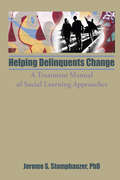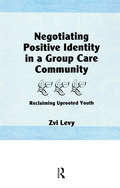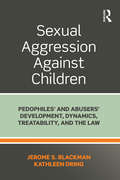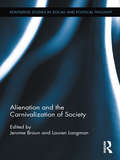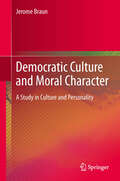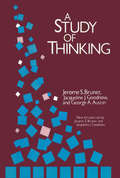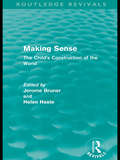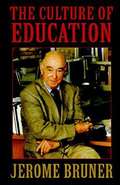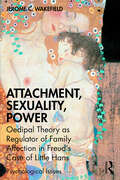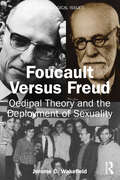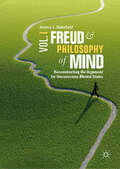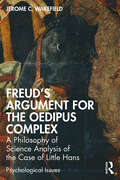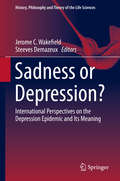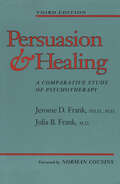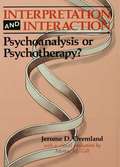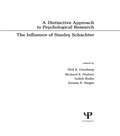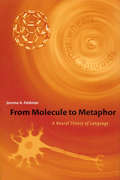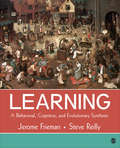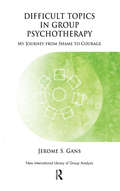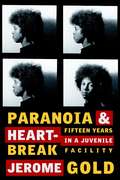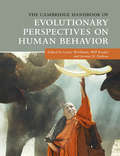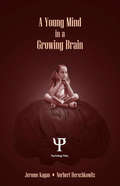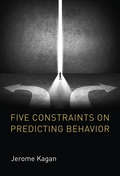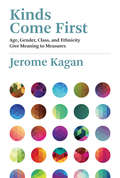- Table View
- List View
Helping Delinquents Change: A Treatment Manual of Social Learning Approaches
by Jerome Beker Jerome StumphauzerHelping Delinquents Change sets before itself a formidable task--that of removing the mystery from the understanding of delinquent behavior. Jerome Stumphauzer offers direct, useful means to work toward altering delinquent behavior. Abandoning an orientation to delinquency that focuses on punishment or medical models, Stumphauzer presents a view of delinquency that emphasizes the learning of adaptive, prosocial behavior, and provides to the youths themselves an opportunity to become engaged in selecting their own goals and methods for changing their behavior. The nondelinquent is presented as an example from whom to learn. The text is nontechnical and useful for students and practitioners alike. The book in intended expressly for those who work directly with delinquents--counselors, teachers, therapists, probation officers, those working in junvenile corrections, and for students of delinquent behavior in psychology, sociology, criminology, and education. Tables, diagrams, references, and indices supplement the text. Helping Delinquents Change is available for classroom adoption. Undergraduate and graduate students in criminology, psychology, counseling, education, and sociology are the primary audience. The book is particularly well-suited as a training manual or supplementary text and an instructor&’s manual is included.
Negotiating Positive Identity in a Group Care Community: Reclaiming Uprooted Youth
by Jerome BekerIn this readable book, Zvi Levy, Hadassim’s Director, provides a careful account of how, over time, he and others have shaped a community to foster health, identity, and competence in distressed young people. Canadian WIZO (Women’s International Zionist Organization) Hadassim is a thriving youth village in Israel that is home for 500 young people and a day educational program for an additional 1,000. Negotiating Positive Identity in a Residential Group Care Community illustrates the organizational expression of a developmental idea, in this case Erik Erikson’s identity development theory, to show how an environment can be created to cope with disrupted development processes among children and adolescents. The book describes an ongoing experiment that started fifteen years ago and has since been recognized as an outstanding success. The basic information and ideas expressed by Levy can be used to improve the effectiveness of any framework through which adolescents pass during the stages of development, including schools, community centers, and normal families. Some of the main topics discussed in this volume are: principles for running a multicultural facility organization of the daily life of a large residential setting major parameters in a residential setting as derived from the theories of Erik Erikson on adolescence as a developmental stage comprehensive care for youth in transition and adolescents suffering from aggravated identity crisesAll child and youth care workers and program administrators can learn much from Levy’s account of Hadassim. Negotiating Positive Identity in a Residential Group Care Community will be disturbing to many who adhere to the current tenets of good management and child care practice; readers need to be prepared to have many assumptions and beliefs challenged. The book emphasizes the distress of immigrant and troubled urban youth as an aggravated identity crisis, the cause of which needs to be treated before the symptom. This volume is of interest to theoreticians, practitioners, and policymakers in the fields of education, child and youth care, and developmental psychology, as well as scholars in Erikson’s theories. It is also useful in courses which study education in Israel or that seek solutions to problems such as homeless youth in the Third World.Negotiating Positive Identity in a Residential Group Care Community stresses that: The answer to deprivation is not the provision of efficient services, but an environment and an approach that encourages adolescents to see themselves as active participants and not as patients or passive inmates. Residential settings for children and adolescents can successfully handle large numbers and, in fact, larger numbers can offer some definite advantages. The best way to help children develop into autonomous adults is to give them responsibility for their own choices within the framework of a goal-oriented community.
Sexual Aggression Against Children: Pedophiles’ and Abusers' Development, Dynamics, Treatability, and the Law
by Jerome Blackman Kathleen DringIn Sexual Aggression Against Children: Pedophiles’ and Abusers' Development, Dynamics, Treatability, and the Law, Drs. Blackman and Dring use multiple psychoanalytic principles to answer, “Why do people sexually abuse children?” and “Why are most abusers male”? They address the legal and mental health professions’ minimization of the horrific nature of child sexual abuse, explain how to assess pedophiles’ treatability, and discuss cases of adolescent and adult predators. Also, developmental analysis of sexual predation is integrated with a review of judicial decisions regarding civil commitment and punishment of abusers. The authors suggest how courts, evaluators, and legislatures can preserve constitutional rights of sexual offenders while prioritizing protection of children.
Alienation and the Carnivalization of Society (Routledge Studies in Social and Political Thought)
by Jerome Braun Lauren LangmanThis book examines alienation from both a sociological and psychoanalytic perspective, revisiting classic treatments of the topic (Marx, Simmel, Weber) and exploring its relevance to understanding post-modern consumer society. It examines the escapist potentials for good and for ill in modern society - those fostered by commercial interests, and those maintained by individuals and groups as their form of resisting alienation.
Democratic Culture and Moral Character
by Jerome BraunThis book returns critical theory to its roots in both psychology and the social sciences. It shows some of the relationships between equality in a political and social sense and personal identity that either relates well to such equality, or rebels against it. All this reflects processes of social and cultural influence that involve not only random change but also processes of social and cultural evolution that themselves have effects regarding potentials for self-fulfillment and even public morality. This book provides a framework to help one study the interaction between individual aspirations and social opportunities. Jerome Braun, known for his writings in interdisciplinary social science, an approach he calls pragmatic critical theory, here provides a book that discusses issues relevant to the moral underpinnings of democratic society, including issues of social evolution and of culture and personality. This book will be of particular interest to scholars and students of Psychology (particularly in the areas of Psychology of Personality and Cultural Psychology), Sociology (especially those interested in Sociology of Alienation and Sociology of Culture, as well as Sociology of Mental Health), Anthropology (particularly in the area of Psychological Anthropology), Cultural Studies, and Social Theory in general.
A Study of Thinking
by Jerome BrunerA Study of Thinking is a pioneering account of how human beings achieve a measure of rationality in spite of the constraints imposed by bias, limited attention and memory, and the risks of error imposed by pressures of time and ignorance. First published in 1956 and hailed at its appearance as a groundbreaking study, it is still read three decades later as a major contribution to our understanding of the mind. In their insightful new introduction, the authors relate the book to the cognitive revolution and its handmaiden, artificial intelligence.The central theme of the work is that the scientific study of human thinking must concentrate upon meaning and its achievement rather than upon the behaviorists' stimuli and responses and the presumed connections between them. The book's point of departure is how human beings group the world of particulars into ordered classes and categories-concepts-in order to impose a coherent and manageable order upon that world. But rather than relying principally on philosophical speculation to make its point, A Study of Thinking reports dozens of experiments to elucidate the strategies that people use in penetrating to the deep structure of the information they encounter.This seminal study was a major event in the cognitive revolution of the 1950s. Reviewing it at the time, J. Robert Oppenheimer said it "has in many ways the flavor of conviction which makes it point to the future."
Making Sense: The Child's Construction of the World (Routledge Revivals)
by Jerome BrunerThe growing child comes to understand the world, makes sense of experience and becomes a competent social individual. First published in 1987, Making Sense reflected the way in which developmental psychologists had begun to look at these processes in increasingly naturalistic, social situations. Rather than seeing the child as working in isolation, the authors of this collection take the view that 'making sense' involves social interaction and problem-solving. They particularly emphasize the role of language; its study both reveals the child's grasp of the frames of meaning in a particular culture, and demonstrates the subtleties of concept development and role-taking.
The Culture of Education
by Jerome BrunerThis is a book of essays about education. In this commentary on the possibilities of education, eminent psychologist Jerome Bruner explains how education can usher children into their culture, though it often fails to do so. Bruner explores new and rich ways of approaching many of the classical problems that perplex educators.
Attachment, Sexuality, Power: Oedipal Theory as Regulator of Family Affection in Freud’s Case of Little Hans (Psychological Issues)
by Jerome C. WakefieldIn Attachment, Sexuality, Power, Jerome C. Wakefield challenges established views of Freudian psychoanalysis by applying Foucault’s concept of ‘power/knowledge’ to Freud’s case of Little Hans, illuminating the role that Oedipal theory has played in reorganizing intimate family relationships. Combining close examination of the Hans case with accounts of the history of marriage and psychology of co-sleeping, this book argues that the Oedipal theory achieved prominence because its implications for family dynamics supported changing social values. Wakefield identifies a previously overlooked reason for Hans’s anxiety—his father attempted to protect Hans from his supposed Oedipal desires by separating Hans from his mother. Thus, Wakefield argues, the father’s exercise of power based on his belief in Oedipal theory, not an actual Oedipus complex, caused Hans’s vulnerability to anxiety—revealing the theory’s potential to cause harm by distancing children from their parents, even as such distancing made the theory socially appealing. This book’s novel and carefully documented articulation of the mechanisms of power by which Oedipal theory exerts its influence on family life will be of interest to psychoanalysts and psychotherapists alike, and essential for scholars in the fields of psychoanalysis, philosophy of science and the history of psychiatry.
Foucault Versus Freud: Oedipal Theory and the Deployment of Sexuality (Psychological Issues)
by Jerome C. WakefieldIn Foucault Versus Freud, Jerome C. Wakefield offers a novel analysis of one of the great intellectual clashes of our times, the attack on Sigmund Freud's influential sexual theories by the eminent French philosopher and historian of ideas Michel Foucault.Starting from Foucault's question, "What makes the psychoanalytic theory of incest acceptable to the bourgeois family?", and drawing on Foucault's relatively unexplored published lectures as well as his celebrated History of Sexuality, Vol. 1, Wakefield evaluates Foucault's argument that there is a continuity between the two-century medical anti-masturbation crusade and Freud's theory, providing the reader with an accessible introduction to Foucault's conceptual innovations including power/knowledge, the deployment of sexuality, and the use of surveillance and confession as tactics in medicalizing sexuality and reshaping family life.Rather than allowing the argument to stay at the evidentially uncertain level one often finds in Foucault's writings, Wakefield undertakes close readings of both Freud's "seduction-theory" texts and later Oedipal-period texts to test whether Foucault's provocative arguments find support or disconfirmation. Despite identifying weaknesses in Foucault's position, Wakefield argues that a careful look at Freud's sexual theories through Foucault's theoretical lens changes forever the way one sees Freud's theory—and has the potential to help psychoanalysis move forward in a constructive way.This book is written to be understandable for those who are not steeped in philosophy or familiar with Foucault's philosophy, offering a lucid introduction to Foucault's ideas and his clash with Freud that will be of interest to clinicians, students, and scholars alike.
Freud and Philosophy of Mind, Volume 1: Reconstructing the Argument for Unconscious Mental States
by Jerome C. WakefieldThis book consists of a focused and systematic analysis of Freud’s implicit argument for unconscious mental states. The author employs the unique approach of applying contemporary philosophical methods, especially Kripke-Putnam essentialism, in analyzing Freud’s argument. The book elaborates how Freud transformed the intentionality theory of his Cartesian teacher Franz Brentano into what is essentially a sophisticated modern view of the mind. Indeed, Freud redirected Brentano's analysis of consciousness as intentionality into a view of consciousness-independent intentionalism about the mental that in effect set the agenda for latter-twentieth-century philosophy of mind.
Freud's Argument for the Oedipus Complex: A Philosophy of Science Analysis of the Case of Little Hans (Psychological Issues)
by Jerome C. WakefieldIn this close reading of Freudian theory, Jerome C. Wakefield reconstructs Freud’s argument for the Oedipal theory of the psychoneuroses, placing the case of Little Hans into a philosophy-of-science context and critically rethinking the epistemological foundations of psychoanalysis. Wakefield logically evaluates four central Freudian arguments: the "undirected anxiety" argument which contends that Hans suffered from anxiety before he developed his horse phobia; the "day the horse fell down" argument where, engaging in some scholarly detective work, Wakefield resolves a century-old dispute between behaviorists and psychoanalysts about when Hans witnessed a frightening horse accident; the "N=1 sexual repression" argument that the trajectory of Hans’s sexual desires matches the Oedipal theory’s predictions; and lastly, the "detailed symptom characteristics" argument that the Oedipal theory is needed to understand otherwise inexplicable details of Hans’s symptoms. Wakefield demonstrates that, although Freud’s arguments are brilliantly conceived, he misread the facts of the Hans case and failed to support the Oedipal theory as judged by his own stated evidential standards. However, this failure creates an opportunity for renewed consideration of psychoanalysis’s distinctive contribution: the understanding of an individual’s unique meaning system and confrontation with meanings outside of focal awareness in order to reshape an individual’s fate. This book will be of interest to psychoanalysts and psychotherapists alike, and will prove essential for scholars working in the fields of psychoanalysis, philosophy of science, and the history of psychiatry.
Sadness or Depression?
by Jerome C. Wakefield Steeves DemazeuxThe World Health Organization states that depression is the leading cause of disability worldwide, and predicts that by 2030 the epidemic of depression raging across the world will be the single biggest contributor to the overall burden of disease of all health conditions. Yet this gloomy picture masks a number of paradoxes concerning the diagnosis and cultural interpretation of depression that appear to challenge the claimed prevalence rates on which it is based. This book's essays by some of the world's leading researchers and scholars on depression explores these anomalies in detail from multidisciplinary and multicultural perspectives, and in doing so reshapes the debate on the nature of depression that is currently under way in the US and abroad. At the book's core is the exploration from the multiple perspectives of a key dilemma: is the epidemic of depression real or is it just apparent? In particular, could it be the result of criteria laid down in the official American classification system of mental disorders, the DSM, interacting with cultural changes to reshape our view of melancholy, pathologizing what were formerly normal symptoms of grief or intense sadness? The debate over the DSM's conception of depression has an international relevance, with the WHO's upcoming revisions to its International Classification of Diseases requiring coordination with the DSM. This collection of perspectives has an unprecedented international dimension, as scholars from Europe and around the world join US academics to explore a central and controversial element of contemporary psychiatric diagnosis - and one that has enormous practical implications for the future of mental health care and how we view our emotions. The book's accessible essays will make it useful to scholars, practitioners, and students across a wide range of disciplines.
Persuasion and Healing: A Comparative Study of Psychotherapy
by Jerome D. Frank Julia B. FrankThis popular study of "psychological healing"treats topics ranging from religious revivalism and magical healing to contemporary psychotherapies, from the role of the shaman in nonindustrialized societies to the traditional mental hospital. Jerome and Julia Frank (who are father and daughter) contend that these therapies share common elements that improve the "morale"of sufferers. And in combating the "demoralizing meaning"that people attach to their experiences, the authors argue, many therapies are surprisingly similar to rhetoric (the art of persuasion) and to hermeneutics (the study of meanings).Highly acclaimed in previous editions, Persuasion and Healing has been completely revised and expanded. In addition to a broadened exploration of the role of demoralization in illness, this latest edition offers updated information on topics including self-help, family therapy, psychopharmacology, psychotherapy for the mentally ill, and techniques such as primal therapy and bioenergetics. As they explore the power of "healing rhetoric"in these activities, the authors strengthen the ties among the various healing profession.
Interpretation and Interaction: Psychoanalysis or Psychotherapy?
by Jerome D. OremlandIn recent decades the relationship between psychoanalysis and psychotherapy has been a focal point for debate about the distinctiveness of analysis as a particular kind of therapeutic enterprise. In Interpretation and Interaction, Jerome Oremland invokes the interventions of "interpretation" and "interaction," rooted in the values of understanding and amelioration, respectively, as a conceptual basis for reappraising these important issues. In place of the commonly accepted triadic division among psychoanalysis, exploratory psychotherapy, and supportive psychotherapy, he proposes a new triad: psychoanalysis, psychoanalytically-oriented psychotherapy, and interactive psychotherapy. Anchoring his classification in what he terms the "orientation of the therapy" rather than the "orientation of the therapist," Oremland submits that analysis and psychoanalytically-oriented psychotherapy strive systematically to interpret the therapeutic interaction as expressed in the transference. Interactive psychotherapy, on the other hand, uses the transference selectively to ameliorate psychic stress. Interpretation and Interaction is enriched by a concluding chapter from Merton Gill, a preeminent authority on the therapeutic process. Gill's critical appreciation of Oremland's proposals amounts to an illuminating refinement of his own position on the relationship between psychoanalysis and psychotherapy. Scholarly in conception, thoughtful in tone, and pragmatic in yield, Interpretation and Interaction is a clarifying addition to the psychoanalytic theory of psychotherapy. It will have the practical consequence, in Gill's words, of "aiding clinicians in retaining their analytic identities and their analytic orientation across the spectrum of their therapeutic work."
A Distinctive Approach To Psychological Research: The Influence of Stanley Schachter
by Richard E. Nisbett Judith Rodin Neil E. Grunberg Jerome E. SingerFirst published in 1987. Routledge is an imprint of Taylor & Francis, an informa company.
From Molecule to Metaphor: A Neural Theory of Language
by Jerome FeldmanIn From Molecule to Metaphor, Jerome Feldman proposes a theory of language and thought that treats language not as an abstract symbol system but as a human biological ability that can be studied as a function of the brain, as vision and motor control are studied. This theory, he writes, is a "bridging theory" that works from extensive knowledge at two ends of a causal chain to explicate the links between. Although the cognitive sciences are revealing much about how our brains produce language and thought, we do not yet know exactly how words are understood or have any methodology for finding out. Feldman develops his theory in computer simulations—formal models that suggest ways that language and thought may be realized in the brain. Combining key findings and theories from biology, computer science, linguistics, and psychology, Feldman synthesizes a theory by exhibiting programs that demonstrate the required behavior while remaining consistent with the findings from all disciplines.After presenting the essential results on language, learning, neural computation, the biology of neurons and neural circuits, and the mind/brain, Feldman introduces specific demonstrations and formal models of such topics as how children learn their first words, words for abstract and metaphorical concepts, understanding stories, and grammar (including "hot-button" issues surrounding the innateness of human grammar). With this accessible, comprehensive book Feldman offers readers who want to understand how our brains create thought and language a theory of language that is intuitively plausible and also consistent with existing scientific data at all levels.
Learning: A Behavioral, Cognitive, and Evolutionary Synthesis
by Jerome Frieman Stephen ReillyLearning: A Behavioral, Cognitive, and Evolutionary Synthesis provides an integrated account of the psychological processes involved in learning and conditioning and their influence on human behavior. With a skillful blend of behavioral, cognitive, and evolutionary themes, the text explores various types of learning as adaptive specialization that evolved through natural selection. Robust pedagogy and relevant examples bring concepts to life in this unique and accessible approach to the field.
Learning: A Behavioral, Cognitive, and Evolutionary Synthesis (Psychology Ser.)
by Jerome Frieman Stephen ReillyLearning: A Behavioral, Cognitive, and Evolutionary Synthesis provides an integrated account of the psychological processes involved in learning and conditioning and their influence on human behavior. With a skillful blend of behavioral, cognitive, and evolutionary themes, the text explores various types of learning as adaptive specialization that evolved through natural selection. Robust pedagogy and relevant examples bring concepts to life in this unique and accessible approach to the field.
Difficult Topics in Group Psychotherapy: My Journey from Shame to Courage (The New International Library of Group Analysis)
by Jerome GansThis book contains eleven selected papers on difficult topics group therapists encounter in their work. Based on the author's forty years in the field, these papers include the topics of shame, courage, hostility, combined individual and group therapy, money, indirect communication, difficult patients, silence, and the missed session. Written from a psychodynamic orientation with a relational emphasis, they pay special attention to countertransference. An autobiographical introduction to each paper discusses what experiences have led the author to write on each topic. These introductions honor the role that personal experience has played in the evolution of Dr Gan's therapeutic presence.
Paranoia & Heartbreak: Fifteen Years in a Juvenile Facility
by Jerome GoldFor fifteen years, Jerome Gold worked as a rehabilitation counselor in a prison for juveniles in Washington state. Throughout his time there, he kept a journal of his experiences with youths who had been incarcerated for murder, kidnap, assault, rape and other sex offenses, auto theft, burglary, and selling drugs. What started as a journal designed to relieve stress turned into the evocation of one man's nuanced perspective on a unique group of young people. Paranoia & Heartbreak tells Gold's personal story of coming to terms with people who have crossed over to the other side of their own humanity. Writing from ample experience and with unflinching compassion, Gold brings the reader to see these "deviants"--and through them, in some slanted way, our whole society, with an unexpected intensity.
The Cambridge Handbook of Evolutionary Perspectives on Human Behavior (Cambridge Handbooks in Psychology)
by Lance Workman Will Reader Jerome H. BarkowThe transformative wave of Darwinian insight continues to expand throughout the human sciences. While still centered on evolution-focused fields such as evolutionary psychology, ethology, and human behavioral ecology, this insight has also influenced cognitive science, neuroscience, feminist discourse, sociocultural anthropology, media studies, and clinical psychology. This handbook's goal is to amplify the wave by bringing together world-leading experts to provide a comprehensive and up-to-date overview of evolution-oriented and influenced fields. While evolutionary psychology remains at the core of the collection, it also covers the history, current standing, debates, and future directions of the panoply of fields entering the Darwinian fold. As such, The Cambridge Handbook of Evolutionary Perspectives on Human Behavior is a valuable reference not just for evolutionary psychologists but also for scholars and students from many fields who wish to see how the evolutionary perspective is relevant to their own work.
A Young Mind in a Growing Brain
by Jerome Kagan Norbert HerschkowitzA Young Mind in a Growing Brain summarizes some initial conclusions that follow simultaneous examination of the psychological milestones of human development during its first decade and what has been learned about brain growth. This volume proposes that development is the process of experience working on a brain that is undergoing significant biological maturation. Experience counts, but only when the brain has developed to the point of being able to process, encode, and interact with these new environmental experiences. This book's aim is to acquaint developmental biologists and neuroscientists with what has been learned about human psychological development and to acquaint developmental psychologists with the biological evidence. The hope is that each group will gain a richer appreciation of both knowledge corpora. The authors hope to appeal to neuroscientists, psychologists, psychiatrists, pediatricians, and their students. The idea for this book was born in 1993 when the authors--a leading developmental psychologist and a pediatrician--met for the first time and recognized the complementarity of their backgrounds and the utility of a collaboration. The reception of their first two papers motivated this attempt to synthesize the available information over a longer developmental era. Learning a great deal over the past decade, the authors hope that their enthusiasm provokes an equally intense curiosity in readers.
Five Constraints on Predicting Behavior
by Jerome KaganA distinguished psychologist considers five conditions that constrain inferences about the relation between brain activity and psychological processes. Scientists were unable to study the relation of brain to mind until the invention of technologies that measured the brain activity accompanying psychological processes. Yet even with these new tools, conclusions are tentative or simply wrong. In this book, the distinguished psychologist Jerome Kagan describes five conditions that place serious constraints on the ability to predict mental or behavioral outcomes based on brain data: the setting in which evidence is gathered, the expectations of the subject, the source of the evidence that supports the conclusion, the absence of studies that examine patterns of causes with patterns of measures, and the habit of borrowing terms from psychology. Kagan describes the important of context, and how the experimental setting—including the room, the procedure, and the species, age, and sex of both subject and examiner—can influence the conclusions. He explains how subject expectations affect all brain measures; considers why brain and psychological data often yield different conclusions; argues for relations between patterns of causes and outcomes rather than correlating single variables; and criticizes the borrowing of psychological terms to describe brain evidence. Brain sites cannot be in a state of “fear.” A deeper understanding of the brain's contributions to behavior, Kagan argues, requires investigators to acknowledge these five constraints in the design or interpretation of an experiment.
Kinds Come First: Age, Gender, Class, and Ethnicity Give Meaning to Measures (The\mit Press Ser.)
by Jerome KaganAn argument that the meaning of a psychological or biological measure depends on the age, gender class, and ethnicity of the human subject.In Kinds Come First, the distinguished psychologist Jerome Kagan argues that—contrary to the common assumption—age, gender, social class, and ethnicity affect the outcomes of psychological measures, and he questions the popular practice that uses statistical procedures to remove the effects of these categories to confirm a favored predictor-outcome relation. The idea that psychological measures have meanings that transcend the kinds of subjects, Kagan writes, reflects a premature hope of discovering broadly generalizable conclusions. In Kinds Come First, Kagan hopes to persuade investigators otherwise.Kagan examines the unique properties of the four categories, making the case that life stage, gender, class, and ethnicity affect psychological measures in complex, nontrivial ways. He discusses the relevance of a person's developmental stage to many outcomes, focusing on the interval from five to twelve months, when working memory and the ability to relate the past to the present expands. He cites evidence suggesting that a person's gender, class of rearing, and ethnicity, within a particular society, are better predictors of health, arrest record, cognitive skills, and current life satisfaction than either their genomes or answers to a personality questionnaire. Finally, Kagan argues, the biological properties that are more common in one gender, class, or ethnic group, are not a defensible basis for restricting access to an educational program, vocation, or position of authority. A society can ignore such differences in order to honor an ethical imperative for equality without incurring serious costs.
